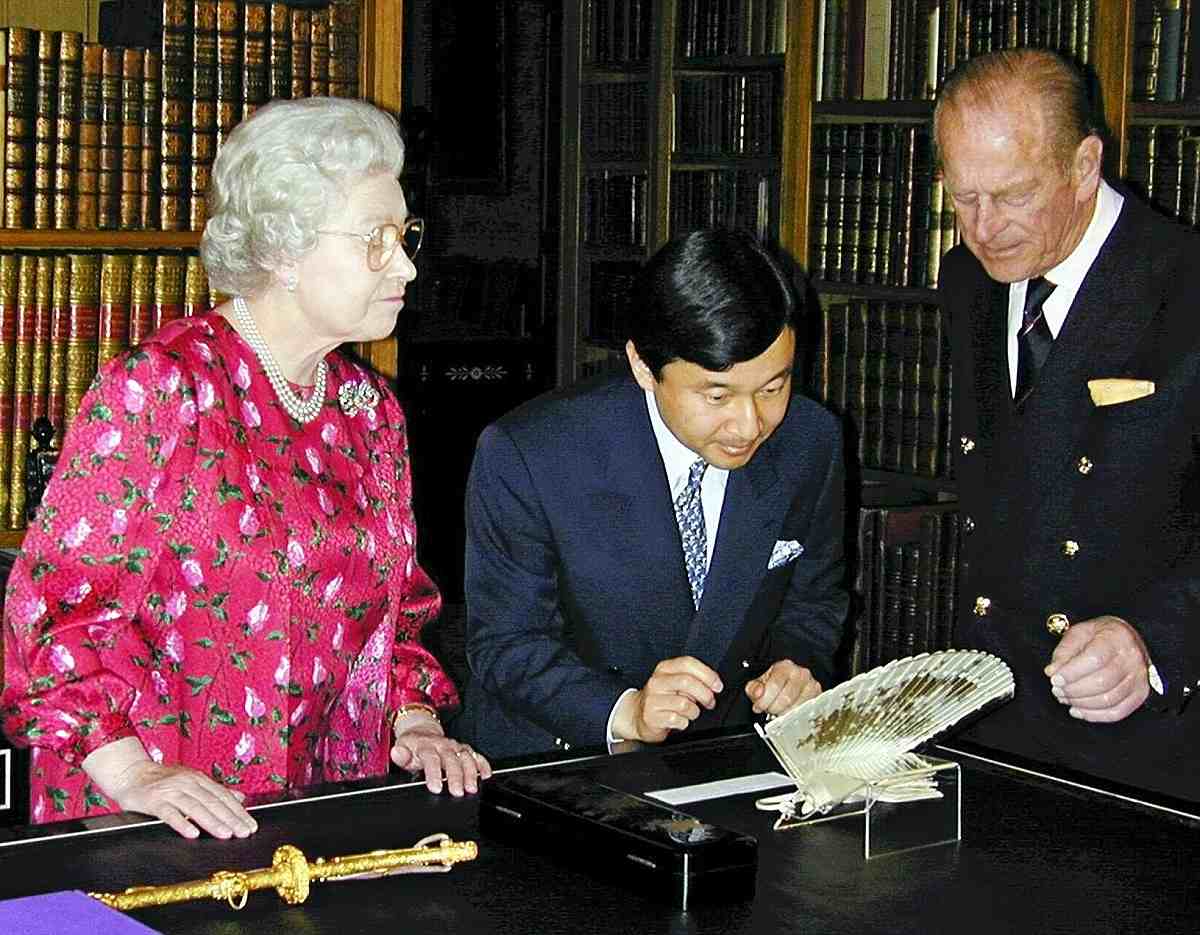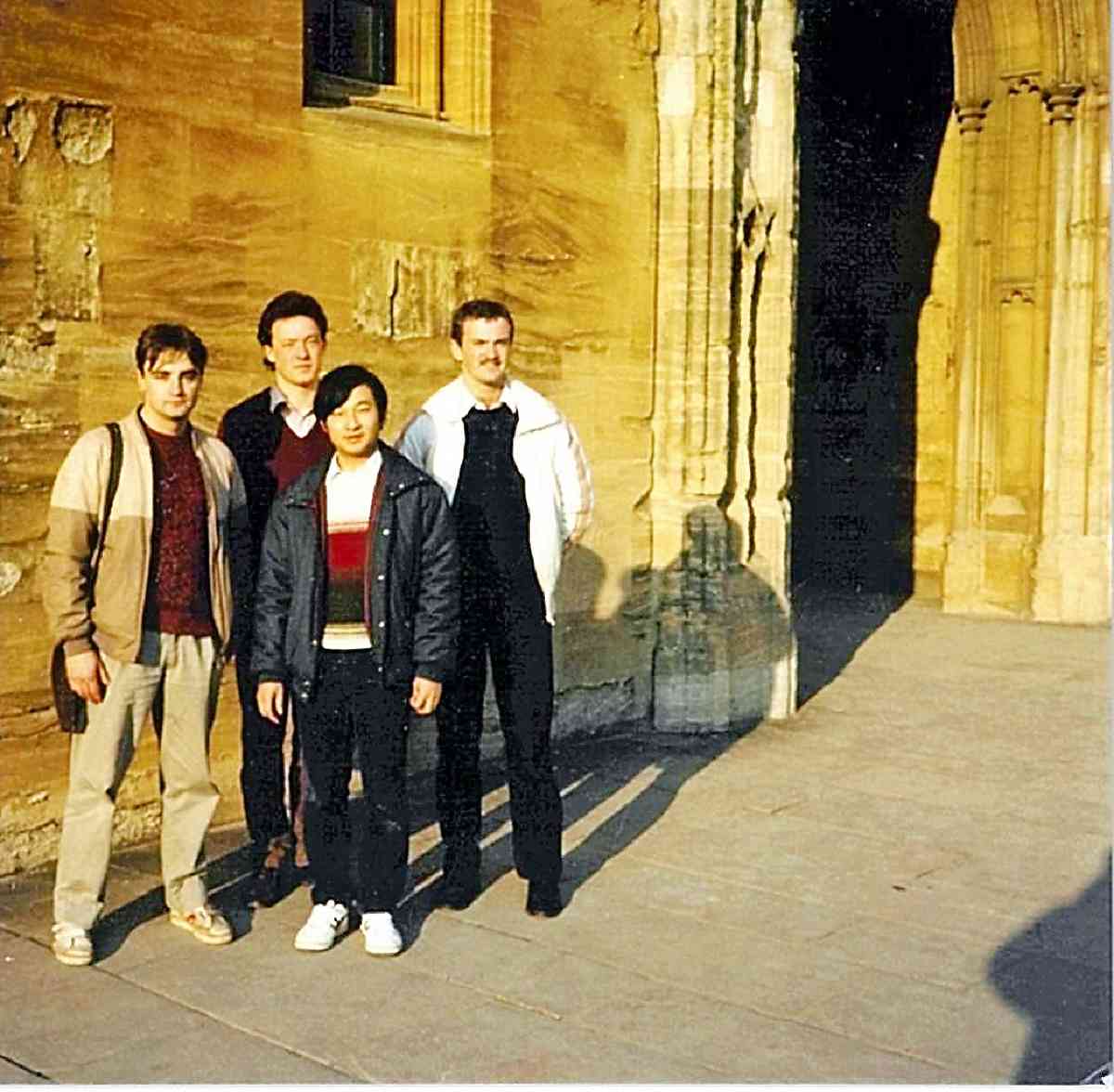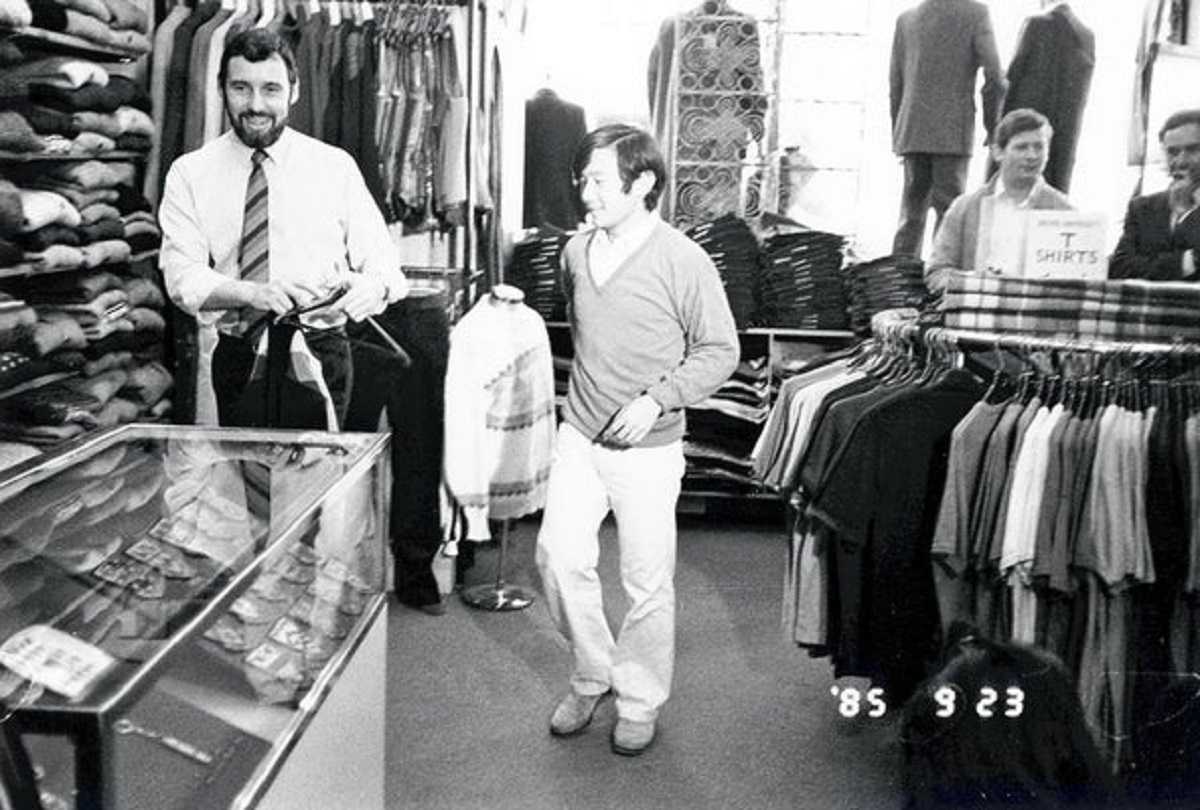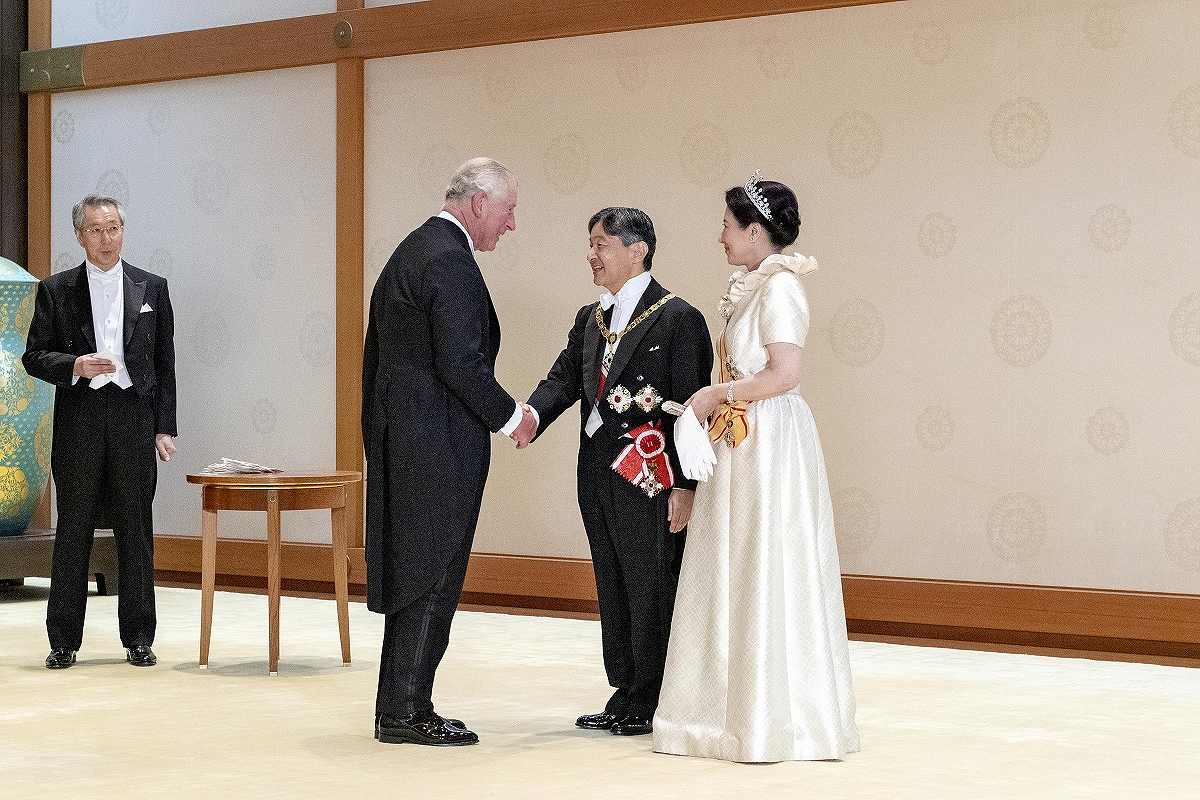Emperor’s Role in Japan-U.K. Ties / Japan Emperor’s Time in U.K. Spent Learning About British Constitutional Monarchy; Studying Overseas Proved to be Impactful

From left, Queen Elizabeth II, the Emperor, center, look at a fan given by the Imperial family to the British royal family at King George VI’s coronation ceremony, at Windsor Castle in May 2001.
The Yomiuri Shimbun
6:00 JST, June 20, 2024
While he was studying in the United Kingdom, the Emperor learned how a British monarch should behave and how a constitutional government should function.
The Emperor and Empress are set to visit Britain as state guests for eight days from Saturday.
The Imperial couple’s visit to the United Kingdom was originally scheduled for 2020 — their first official trip as Emperor and Empress. However, it was postponed due to the pandemic, followed by the death of Queen Elizabeth II, who had initially invited them to the country.
With an invitation from King Charles III, the goodwill visit will finally be realized after five years. This is the first installment in a series in which The Yomiuri Shimbun has traced the history between the Imperial family and the British royal family, and learned about the Emperor’s thoughts and wishes.
***
When the Emperor was a prince, he listened to a lecture by Masami Ito, professor emeritus at the University of Tokyo, in late May 1983, a month before he was set to leave to study in the United Kingdom. Ito was an authority on Anglo-American law and Japan’s Constitution.
The lecture covered the first chapter of the Constitution, “The Emperor,” as well as the second chapter, “Renunciation of War.” The Emperor Emeritus, who was then crown prince, also attended the lecture.
The current Emperor was 23 years old at the time.
“I felt the Emperor Emeritus’ consideration as a father for his son,” said Hideomi Tezuka, 90, who sat with them as a chamberlain. “He wanted him to learn about the British constitutional monarchy after understanding the system that positions the Emperor as the symbol of the state as stipulated in the peace Constitution.”
A day after arriving in London, the Emperor observed the opening of the British Parliament.
In “Temuzu to Tomoni” (The Thames and I: A Memoir of Two Years at Oxford), a memoir he wrote about his time in Britain, the Emperor described a ceremony that was attended by Queen Elizabeth II.
A series of ceremonial procedures express the philosophy of a government that centers on the parliament, independent of the monarchy, the Emperor wrote. This philosophy dates back to the Puritan Revolution.
While in Britain, the Emperor was invited by the queen to a tea ceremony and garden party at Buckingham Palace.
In summer 1984, the Emperor visited the queen at Balmoral Castle, the vacation home of the British royal family, and enjoyed a picnic and barbecue. The Emperor was even in the passenger seat of a car driven by the queen.
A former chamberlain of the queen recalled that she gave detailed instructions on receiving the Emperor, saying that her treatment toward him was similar to a grandmother caring for her grandson.
The relationship between the Imperial family and the British royal family dates back to 1869, when Prince Alfred, the second son of Queen Victoria, made the first British royal state visit to Japan.
When Emperor Showa visited the United Kingdom in 1921 as the crown prince at 20 years old, King George V also recommended that he closely look at the terrible state of the country following World War I.
Emperor Showa later said that what he heard from King George V about constitutional politics was the root of what he had thought his entire life.
In 1953, the Emperor Emeritus, then a 19-year-old crown prince, was invited to the queen’s coronation. In a ceremony steeped in history and tradition, he inscribed in his memory her pledge to serve her people.
The last time the Emperor met the queen was during his visit in 2001.
At Windsor Castle, the Emperor listened to an explanation about various items that illustrated the history of the exchange between Japan and Britain.
For his visit this time, the Emperor asked that he be able to offer flowers at the queen’s final resting place.
When the Emperor heard the news about the queen’s death, he was said to have spoken about the respect he had for her, a woman who had served her country with both kindness and dignity.
His experience as a student in the United Kingdom would be as impactful to him as his grandfather’s and father’s visits to the country when they were young.
Related Articles
Most Read
Popular articles in the past 24 hours
-

Voters Using AI to Choose Candidates in Japan's Upcoming General ...
-

Japan's Snow-Clad Beauty: Camellia Flowers Seen in Winter Bloom a...
-

Monkey Strikes Junior High School Girl from Behind in Japan's Yam...
-

Genichiro Inokuma's Mural in Ueno Station That Gave Hope in Postw...
-

Senior Japanese Citizens Return to University to Gain Knowledge, ...
-

Foreign and Security Policy: Political Parties Must Discuss How T...
-

Heavy Snow Linked to 30 Deaths across Japan since Late Jan.; JMA ...
-

Tokyo Police Arrest Head of Resignation Assistance Firm
Popular articles in the past week
-

Japan Institute to Use Domestic Commercial Optical Lattice Clock ...
-

Australian Woman Dies After Mishap on Ski Lift in Nagano Prefectu...
-

Foreign Snowboarder in Serious Condition After Hanging in Midair ...
-

Chinese Embassy in Japan Reiterates Call for Chinese People to Re...
-

Narita Airport, Startup in Japan Demonstrate Machine to Compress ...
-

Toyota Motor Group Firm to Sell Clean Energy Greenhouses for Stra...
-

Sakie Yokota, Last Surviving Parent of a North Korea Abductee, Ur...
-

Beer Yeast Helps Save Labor, Water Use in Growing Rice; Govt Hope...
Popular articles in the past month
-

Univ. in Japan, Tokyo-Based Startup to Develop Satellite for Disa...
-

JAL, ANA Cancel Flights During 3-day Holiday Weekend due to Blizz...
-

China Confirmed to Be Operating Drilling Vessel Near Japan-China ...
-

China Eyes Rare Earth Foothold in Malaysia to Maintain Dominance,...
-

M6.2 Earthquake Hits Japan's Tottori, Shimane Prefectures; No Tsu...
-

Japan Institute to Use Domestic Commercial Optical Lattice Clock ...
-

Japan, Qatar Ministers Agree on Need for Stable Energy Supplies; ...
-

Japan, Italy to Boost LNG Cooperation; Aimed at Diversifying Japa...
Top Articles in Society
-

JAL, ANA Cancel Flights During 3-day Holiday Weekend due to Blizzard
-

Record-Breaking Snow Cripples Public Transport in Hokkaido; 7,000 People Stay Overnight at New Chitose Airport
-

Australian Woman Dies After Mishap on Ski Lift in Nagano Prefecture
-

Foreign Snowboarder in Serious Condition After Hanging in Midair from Chairlift in Nagano Prefecture
-

Train Services in Tokyo Resume Following Power Outage That Suspended Yamanote, Keihin-Tohoku Lines (Update 4)
JN ACCESS RANKING
-

Univ. in Japan, Tokyo-Based Startup to Develop Satellite for Disaster Prevention Measures, Bears
-

JAL, ANA Cancel Flights During 3-day Holiday Weekend due to Blizzard
-

China Confirmed to Be Operating Drilling Vessel Near Japan-China Median Line
-

China Eyes Rare Earth Foothold in Malaysia to Maintain Dominance, Counter Japan, U.S.
-

Japan Institute to Use Domestic Commercial Optical Lattice Clock to Set Japan Standard Time










